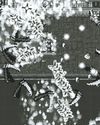
The Oakland, California firestorm of 1991 raged for two days across 1,520 acres and destroyed over 3,000 homes. One belonged to Will Wright. In the weeks and months that followed, the SimCity creator involved himself with rebuilding his house, learning the fundamental principles of architecture and asking himself which components of the home were essential, and which could be bought later on.
The experience gave Wright an idea for a new game. After the release of SimEarth and SimAnt in 1990 and 1991, two titles with plenty of imagination which failed to eclipse the success of SimCity, Wright had three projects on his mind. Project Z would be a simulation of the ill-fated Hindenburg airship which would – mercifully – never enter production. Project Y would eventually become SimCopter. And Project X, drawing on Wright’s experiences in architecture and home design, would become the bestselling PC game ever released.
Not that The Sims bore any obvious marks of genius in its early stages. Initially it tasked the player only with architectural input, challenging them to build functional and aesthetically pleasant homes and drawing inspiration from Christopher Alexander’s book A Pattern Language which presented a ‘function over form’ argument in interior design. Once the homes were built, AI-driven characters would enter and examine them, awarding a score based on the player’s architectural prowess. A prototype was developed under the name Home Tactics: An Experimental Domestic Simulator. Everybody, more or less, hated it.
This story is from the January 2020 edition of Edge.
Start your 7-day Magzter GOLD free trial to access thousands of curated premium stories, and 9,000+ magazines and newspapers.
Already a subscriber ? Sign In
This story is from the January 2020 edition of Edge.
Start your 7-day Magzter GOLD free trial to access thousands of curated premium stories, and 9,000+ magazines and newspapers.
Already a subscriber? Sign In

BONAPARTE: A MECHANIZED REVOLUTION
No sooner have we stepped into the boots of royal guard Bonaparte than we’re faced with a life-altering decision.

TOWERS OF AGHASBA
Watch Towers Of Aghasba in action and it feels vast. Given your activities range from deepwater dives to climbing up cliffs or lumbering beasts, and from nurturing plants or building settlements to pinging arrows at the undead, it’s hard to get a bead on the game’s limits.

THE STONE OF MADNESS
The makers of Blasphemous return to religion and insanity

Vampire Survivors
As Vampire Survivors expanded through early access and then its two first DLCs, it gained arenas, characters and weapons, but the formula remained unchanged.

Devil May Cry
The Resident Evil 4 that never was, and the Soulslike precursor we never saw coming

Dragon Age: The Veilguard
With Dragon Age: The Veilguard, BioWare has made a deeply self-conscious game, visibly inspired by some of the best-loved ideas from Dragon Age and Mass Effect.

SKATE STORY
Hades is a halfpipe

SID MEIER'S CIVILIZATION VII
Firaxis rethinks who makes history, and how it unfolds

FINAL FANTASY VII: REBIRTH
Remaking an iconic game was daunting enough then the developers faced the difficult second entry

THUNDER LOTUS
How Spirit farer's developer tripled in size without tearing itself apart